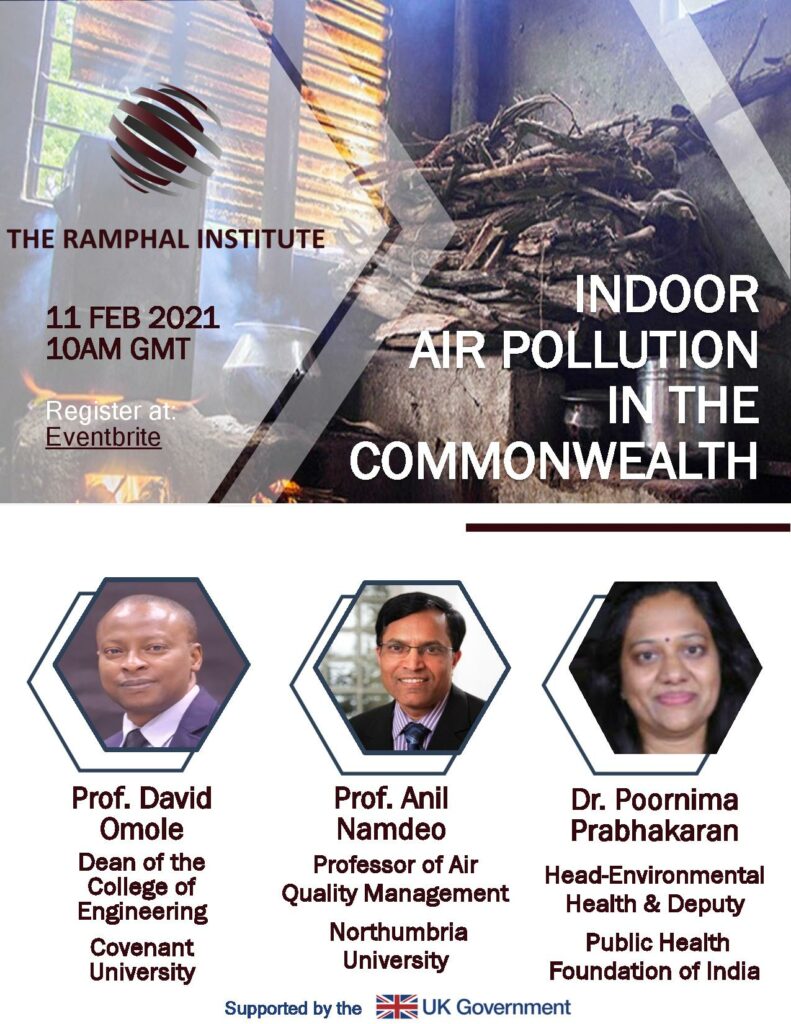Ramphal Institute Virtual Roundtable - Indoor Air Pollution in the Commonwealth

Register here
About this Event
Indoor air pollution, including in the home, school, and workplace, is harmful to the air that humans and pets breathe in. Particulate matter in these environments have been “linked to lung diseases such as asthma, COPD and lung cancer,” including among women, children, and marginalized groups. Indoor air pollution has also been linked to other non-communicable health issues in humans, and result from everyday household and industrial practices, among other things. For instance, the World Health Organization estimates that around 3 billion people, including in Commonwealth countries, still cook or use kerosene stoves and lanterns and biomass. This webinar looks more closely at the adverse health effects of particulate matter in indoor environments in Commonwealth countries, cities and towns.
This webinar is part of the Ramphal Institute’s Virtual Vanguard Series on Air Pollution, with funding from the Foreign, Commonwealth and Development Office (FCDO) Delhi. The series will focus on four thematic areas in several webinars, specifically: transport (aviation, shipping, and road transport); indoor air pollution; agricultural sources of air pollution; and green industries and technologies. The cross-cutting theme of women and marginalized groups will be highlighted in each of these sessions. The virtual Ramphal-tables will precede the main conference in March and provide opportunities for community leaders and the wider public to input more deeply via successive audience-led sessions around each table.
Speakers include:
Professor David Omole
David is a Professor of Water Resources and Environmental Engineering. His research interests include Environmental pollution, air pollution, water pollution, sustainable consumption, groundwater quality, environmental laws and regulations. He is a recipient of the prestigious International Foundation for Science research grant from Sweden, a travel grant from National Research Foundation, South Africa and a travel grant from the German Development Institute. He was Director, Covenant University Consultancy Services (2013), Sub-Dean, College of Engineering (2015), Director, Vice-Chancellor’s Office (2016 – 2018) and presently the Dean, College of Engineering at Covenant University (2018 – present).
Professor Anil Namdeo
Professor Namedeo is Professor of Air Quality Management at Department of Geography and Environmental Sciences at Northumbria University. Prior to that he was a Reader in Air Quality Management at the University of Newcastle; held visiting professorships at the Indian Institute of Technology (IIT) Delhi where he engaged with teaching and research on air quality motioning, modeling and management, and at VIT University in Chennai; and was Associate Director at the Institute of Sustainability in Newcastle. He holds a PhD in Environmental Science from the University of Nottingham and an MTech in Environmental Science and Engineering from the Indian Institute of Technology in Bombay. Professor Namdeo has researched and published on particle pollution from road transport including on Commuter Exposure to Air Pollution, the sustainability implications of emerging green initiatives; and air pollution exposure in unventilated tunnels, including in urban areas.
Dr. Poornima Prabhakaran
Dr. Prabhakaran trained as a physician in Bangalore Medical College and has a Master’s in Epidemiology from the London School of Hygiene and Tropical Medicine and a PhD in Social Medicine from the University of Bristol, UK. After a few years in clinical practice, a short stint at the Clinical Epidemiology and Biostatistics Division and the Population Health Research Institute at the McMaster University in Canada piqued her interest in epidemiology and public health leading her to acquire training in the UK in these disciplines under reputed mentors. Her earlier work in the New Delhi Birth Cohort and the Andhra Pradesh Children and Parents Study (APCAPS) involved studies on the role of early life growth and development on later life cardiometabolic and other chronic disease outcomes, in addition to intergenerational influences on cognitive function and chronic disease risk in the offspring cohorts. Since 2015, Poornima moved her focus to the study of environmental health risk factors recognising that this was missing in children’s’ health research in India. She was instrumental in sensitising the fraternity of birth cohort researchers in India through training and capacity building for environmental health. She has received post-doctoral fellowships from Wellcome Trust, UK and Fogarty Scholarship from USA besides a Public Health Research Initiative Fellowship from the Department of Science and Technology, Government of India. She is currently Additional Professor, Head, Environmental Health and Deputy Director of the Centre for Environmental Health at the Public Health Foundation of India where she leads a team of nearly 20 researchers and consultants on research, training, advocacy, capacity building and remediation for environmental health issues spanning air pollution, climate change, water, sanitation and hygiene, chemical and heavy metal exposures and children’s environmental health. Additionally, she is a Senior Research Scientist at the Centre for Chronic Disease Control, New Delhi where she continues research in life course approach to chronic disease. She leads a consortium of exposure scientists and health researchers working towards building an evidence base for health effects of air pollution in India. She also leads work in engaging health sector leadership for environmental issues across India. She is currently Chair of the research sub-group under the WHO-Global Climate for Health Alliance civil society working group for climate change and health and heads the Centre of Excellence at PHFI for green and climate resilient healthcare under the National Program for Climate Change and Human Health.
Register here